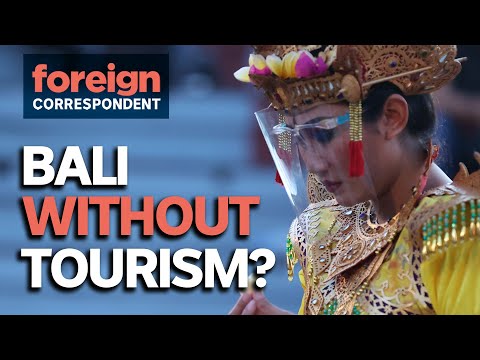The Year Bali Tourism Stopped | Foreign Correspondent

(CHANTING IN LOCAL LANGUAGE) Bali is one of the world's most popular holiday destinations. But has it become a victim of its own success? Decades of unhinged tourist development has come at a cost. The Island of Gods had become the Island of Trash.
(SINGING IN LOCAL LANGUAGE) Now, mostly closed to the outside world, does Bali have a chance for change? A chance to reset? (SINGING CONTINUES) (CHANTING) (CHANTING CONTINUES AND FADES) RECORDING: Normal temperature. Please wear a mask. I arrive in Bali via a domestic flight from Indonesia's capital, Jakarta. For almost a year, the international airport has been shut. Tourism has come to a grinding halt.
RECORDING: Please wear a mask. Walking through the international airport here, a place I've been through many times in my life, is just quite surreal. This is normally bustling with international tourists coming to the Island of the Gods, but today... ..it's so quiet, I can hear the air conditioner. That's the only sound.
Over the past decade, the number of visitors to the island grew rapidly - from 2 million to 6 million. Around 80% of the Balinese economy was generated by tourism. Bali has been shut before. The 2002 Kuta bombings and the erratic eruptions of volcano Agung hurt the tourism industry.
But, ultimately, it bounced back. This time, no-one knows when the pandemic will end. (ROOSTER CROWS) It's now been 12 months. For Marshello Aryafara and the lifeguards of Kuta Beach, their job has changed dramatically.
Ready? Go! Gus, gus, gus. Gus, gus. This beach is usually crammed with tourists, touts and hawkers. Today, Kuta and nearby Seminyak are empty.
For the past year, government handouts have helped, but they haven't gone far enough. The Balinese are relying on each other to make sure those going without get fed. (SPEAKS LOCAL LANGUAGE) (BOTH SPEAK LOCAL LANGUAGE) Thank you.
Thank you. Thank you. Thank you. (SIZZLING) WOMAN: It's weird. It's just...no-one. It's like a ghost town.
I miss Bali getting busy and traffic. I miss traffic! As the tourist centres of south Bali grapple with economic collapse, I want to find out how the Balinese are coping in more remote areas. I'm standing on the beach here in Sanur, on the east coast of Bali, and very shortly, I'll be jumping aboard one of these high-speed boats to cross the Badung Strait to Nusa Lembongan. RECORDING: Please prepare your boarding pass.
Use your face mask. Take off and keep your shoes. Now, last year, there were more than 20 boat companies operating off this beach, sending thousands of tourists back and forth to the island every week.
But now there are only two boats and two trips a day. For decades, this cluster of islands off the east coast of Bali remained sleepy backwaters with little tourist development. MAN: Nusa Lembongan remained, for a long time, sort of a bit of a hidden secret. Over the last five years, that's sort of changed.
Hotelier Troy Sinclair has spent the past 18 years here. He's seen tourism explode. We're talking a massive change in volume and in the numbers coming in.
Here on Nusa Lembongan, the rapid growth brought jobs. Most of the locals found work in tourism. Almost everyone here has been impacted by the shutdown. (SPEAKS LOCAL LANGUAGE) No money, no honey. (LAUGHS) That's all villas and bungalows, all along the hill there, all pretty much empty.
With no money coming in, staff have been let go and maintenance is on hold. This one went down the other day. Pontoons are day-trip businesses. They moor up against these big pontoons, and they then go in to the island for tours to the...Instagram shots.
This pontoon, under normal circumstances, would have had guys on it every day, checking it, diving on it, looking at it, you know? Obviously in these conditions, they simply don't and a small leak can... ..can lead to this very quickly. I've been here a long time. My staff are essentially family. Instead of, you know, letting things fall away or shutting up shop, how do we ensure that they have jobs to come back to? A short motorbike trip from Lembongan is the island of Ceningan.
Every day, people cross this bridge to earn a living in Lembongan's tourist trade. For generations, the channel was used by local families to farm seaweed. But with the arrival of tourism, this industry died off.
The farms made way for day clubs and selfie swings. The seaweed farms have returned because most on the island are now out of work. At low tide, Wayan and his parents harvest seaweed. Working by day or by night, it's tough work.
My parents doesn't want me to seaweed farm. Because this is very hard. Very, very hard. The seaweed is dried before being sent to Java for processing. There it's turned into beauty products, sushi and medicinal extracts. Three again. Wayan left the island to study tourism.
That was the golden ticket for many of his generation. As mass tourism arrived here, Wayan returned in the hopes of building a better life for his young family. Before the pandemic, Wayan and his wife invested their life savings to build a bungalow for tourists. The bungalow has only seen a few guests.
(MOTORBIKE REVS) When Wayan worked at a high end resort, he earned 800 Australian dollars a month. Now, seaweed farming brings in less than $300. And his young family has grown.
This is my little house. So here with my family. My daughter. Three months. Nice to meet you. My wife.
Nice to meet you too. (SINGS IN INDONESIAN) (CONTINUES SINGING) (ROCK MUSIC PLAYS) Change is on everyone's mind. Back on the mainland, generations of Balinese are coming together to plan a different future for the island. (MAN SINGS HARD ROCK MUSIC IN INDONESIAN) WOMAN: This is a wake-up call for all of us. So that we realised that we cannot just depend on one industry, and we have to develop all the other industries that actually have great potential.
Christia Dharmawan runs events at her family's venue, Kebon Vintage. It's become the place for many of these big conversations. I think it's a good time for reflection this year, for sure. Going back to loving our island and make sure that people don't abuse our island as well. For years, locals have been unhappy with the negative impacts of mass tourism. It's clear to Pak Gus Agung, the head of Bali's tourism board, what needs to be done.
Bali's rubbish problem had begun to tarnish its picture perfect reputation long before the pandemic. The island lacks a centralised waste system. There's nowhere for this to go. The island of gods has become the island of trash. That's something Bali-raised Gary Bencheghib is trying to change with his organisation, Sungai Watch. What very little people realise is that all of this plastics that, you know, literally fills up the brink of Kuta Beach comes from somewhere.
And it comes from the rivers. Rivers are essentially the toilets of Indonesia. They're on the backs of hotels, villas. With this lack of waste management that we have on the island, our rivers in Bali have turned into garbage dumps.
The COVID shutdown provided an unexpected opportunity. There was a sense of, we want to go somewhere, we want to do something. And so that's really where we started our weekly clean-ups around the same time. Progressively, you know, we went from, like, 20, 30 an hour, all the way up to 150, 200 people. Because of COVID, people have more time.
There is this community out there that wants to clean and press the reset button on Bali before we open up to international tourism. So here we are, standing waist to knee depth in the rivers. Badung district. He's got all these workers here.
They've all lost their jobs in the COVID pandemic. They used to work in tourism, etc. Now they're out here every day attacking these rivers with sickles and chainsaws, whatever they've got. It's a war on plastic.
There's a long way to go. Thank you. Rivers criss-cross the island, flowing through villages, farms and rice fields. They sustain local communities and the tourism industry. But the rivers are under pressure. Tourists per capita generate 3.5 times more waste than locals.
We're bringing two tonnes of trash every day in our research station to sort. We have a sorting table here to sort plastics into 15 different types of categories, bring it to recycling. Of the 300 tonnes of plastic collected so far, only a third can be recycled.
These guys unfortunately can't be recycled. This is a one-time use, and it has a lifetime behind it, you know? It lives longer than our grandkids' kids' kids' kids' kids' kids' kids. What we're trying to leverage is the brands that are responsible for the plastic packaging. Sachets of instant... Through their comprehensive documentation, Sungai Watch hopes to hold the manufacturers accountable.
Sungai Watch in many ways is more of a data river clean-up organisation. So, really giving that transparency as to what we're finding in the rivers online for everybody to see so, you know, they can engage. (MAN SPEAKS BALINESE) Gede Robi is a musician and an educator. (BAND PLAYS HARD ROCK MUSIC) His band Navicula are rock'n'roll royalty. For two decades, they've brought politics to the young people of Bali through their music. Today, Robi is putting the final touches on his film entitled Pulau Plastic - translated means Plastic Island.
In Indonesia alone, more than 93 million plastic straws are used every day. More than 500 million plastic bags, single-use plastic bags, is used every day. Produced with local NGO Kopernik, this film is a shift for Robi from years of front-line activism. He wants this documentary to put pressure on decisionmakers.
(ACOUSTIC GUITAR MUSIC PLAYS) In Bali, the tourism industry and the waste created by this industry shall become a problem. More people come, then more waste. It's such a...like, it's predictable. It is logical. Logical, right? What is important for us is, uh...prevention. Robi believes that the answers to the island's problems can be found in its traditions.
Will Bali return to the way it was after this pandemic ends? A year on from the start of COVID, Bali is preparing to reopen to visitors. Tourism will return to the island of the gods and bring with it much-needed money. What type of tourism do you want? (PLAYS CHEERFUL MELODY ON XYLOPHONE) The Kuta lifeguards are winding down for the day. No-one knows exactly when these beaches will be full again, but Marcello and his crew will be waiting.
When the tourist coming, we hope they're not littering. The beach has been very clean. I hope you guys still come to Bali. We are here for you.
You can bring good energy and we can give our energy for you guys. (SMOOTH ACOUSTIC GUITAR MELODY PLAYS) Captions by Red Bee Media Copyright Australian Broadcasting Corporation (MAN SINGS IN BALINESE)
2021-03-13 21:44


